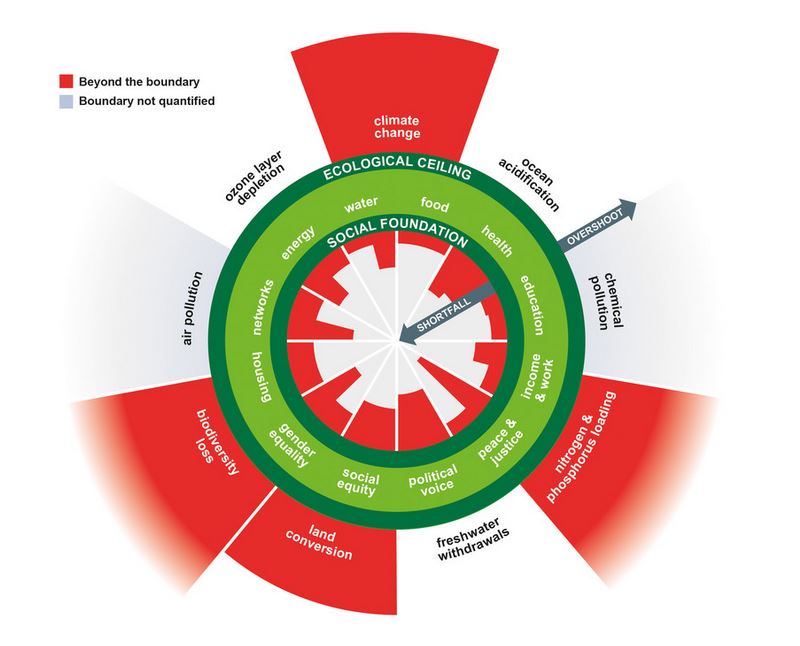Hyderabad: The Covid-19 pandemic has brought the world to a standstill, exposing deep fundamental flaws and shortcomings in the development models followed by countries all this while. The virus has triggered an economic crisis with dire societal consequences, affecting livelihoods of most of the global population. A recent research report said that global poverty could rise to over one billion people due to the coronavirus outbreak.
Amid such a crisis, discussions around ‘Doughnut economics’ have picked up pace once agaiṇ. It is an economic theory that was developed by Kate Raworth of Oxford University in her 2017 book titled ‘Doughnut Economics: Seven Ways to Think Like a 21st-Century Economist’. The theory argues that the aim of economic activity should be “meeting the needs of all within the means of the planet”. It focuses on more inclusive and sustainable form of development through a simple circular diagram.

The diagram basically consists of two rings that resembles a doughnut. The hole at the doughnut’s centre reveals the proportion of people worldwide who fall short on basic essentials such as food, water, healthcare and political freedom of expression.
The area beyond the outer ring represents Earth’s environmental limits. The area between the two rings – the doughnut – is the “ecologically safe and socially just space” in which humanity should strive to live.
The theory explains that how a big part of humanity’s challenge in the 21st century is to get everyone out of that hole. At the same time, the overloading of the ‘Doughnut’ area is undesirable as it will inflict dangerous levels of climate change, ozone depletion, water pollution, loss of species and other assaults on the living world.
Hence, the purpose of doughnut economics is to let most people enter the ‘doughnut’ area and stay there ‘sustainably’.
The story of Amsterdam
Amsterdam became the first city in the world to officially adopt the “doughnut” model of economics after over a year of deliberations in April 2020 as it started working on post-coronavirus recovery.
The city has set well-defined environmental goals, including a plan to become carbon neutral, and plans to transition to a circular economy -- meaning that all materials will be used in closed loops instead of ending up in landfills.
Read more:Government says it is rebooting Indian economy
For instance, housing is one local social challenge in the city, as nearly 20% of tenants can’t afford to pay for other basic bills after paying for rent. More houses are being constructed now to lower rentals but it is simultaneously a climate challenge as traditional construction emits carbon dioxide and other pollutants. Now, as per the doughnut model, the city is finding sustainable building methods to add housing while keepings key factors like connectivity in mind.
Kate Raworth recently said that the need for approaches like that of the doughnut plan adopted by Amsterdam “could hardly be greater right now”. She believes that Amsterdam’s example could inspire many more places to better balance people’s basic needs with preserving planetary resources.
A recent report by World Economic Forum (WEF) titled ‘COVID-19 Risks Outlook: A Preliminary Mapping and Its Implications’ also outlined how this pandemic has given an opportunity to the world to reset its priorities: The report said: “The (coronavirus) crisis offers a unique opportunity to shape a better world. As economies restart, there is an opportunity to embed greater societal equality and sustainability into the recovery, accelerating rather than delaying progress towards the 2030 Sustainable Development Goals and unleashing a new era of prosperity.”
(ETV Bharat Report)


